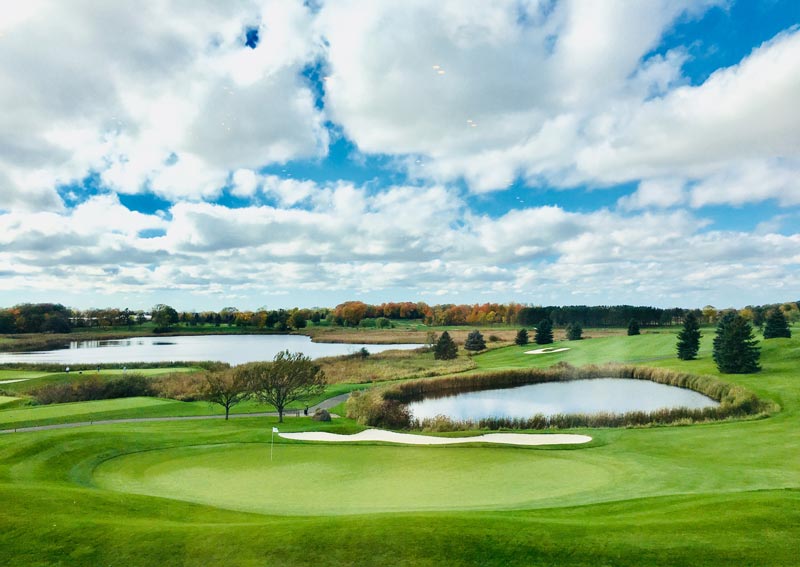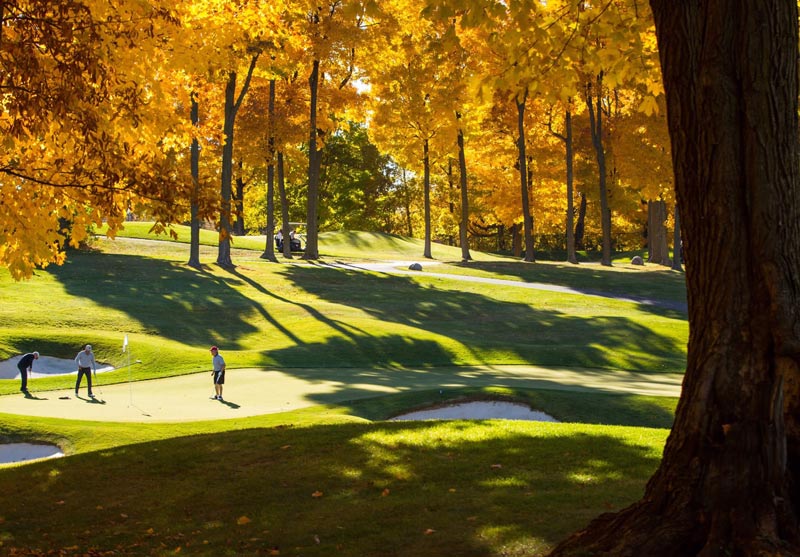
A view of the ninth green at Rush Creek Golf Club in Maple Grove, Minn., a Twin Cities suburb about 20 miles northwest of downtown Minneapolis. The 18-hole course opened in 1996 and features creeping bentgrass greens, tees and fairways. Photos courtesy of Matt Cavanaugh
For many of my years as an assistant superintendent, I was pretty isolated. I had gone to turf school out of state, then moved back to Minnesota, where I worked at only one golf course — Rush Creek Golf Club in Maple Grove, Minn. — from 2000 to 2011. Although I belonged to the Minnesota GCSA, I wasn’t involved in any association events. I really didn’t know anyone in the golf industry in Minnesota, and that could be a pretty lonely feeling.
In 2011, I left the golf course for a sales role at PBI-Gordon, and for the first time, I had a job that required me to meet more people. I have fond memories of going on the “T-Zone Tour” — to promote the company’s T-Zone herbicide — with one particular distributor and getting to know all of his customers. I started to shake hands and kiss babies. I became more involved with the Minnesota GCSA. I actually made friends who — surprise, surprise — had career backgrounds very similar to mine. Getting to know other turfgrass professionals was an eye-opening experience, and I discovered that all assistants and superintendents face many of the same issues.
It may seem strange, but because of my inability to get myself out there, I never really knew how other golf courses approached things, nor did I have any way of learning from my peers. Yes, social media allows us glimpses of the goings-on at other facilities, but those glimpses are often incomplete, and we may only get to see the positive parts of a story.
I’m one of the few individuals (I think) who left a sales role and returned to the golf course, again as an assistant superintendent. The difference when I resumed the assistant post at Rush Creek in 2016, however, was that I had established a network in the turfgrass world. This time would be different.
During the winter of 2016-2017, I began meeting with a few of the friends I’d made in my sales role to talk about life, but mostly to talk about turf. The first few times were impromptu get-togethers, but over the following months, we decided to set a schedule. That way, we could plan for it (and, more importantly, our significant others could plan for it).
And thus, Turf Club was born.
For the past two years, Turf Club has convened on the second Monday of every month. We’ve been so consistent with our meetings that my boys now shout, “Dad, I’ll put you down for Turf Club on the second Monday” when they’re filling out the family calendar on the fridge.
The Rules of Turf Club
I’m breaking the rules of Turf Club, because the first rule of Turf Club is: You do not talk about Turf Club. The second rule of Turf Club is: You do not talk about Turf Club. Sorry, guys — drinks on me next time. (Except for the one sales rep who skipped out on the bill last time. You know who you are.)
There are actually eight rules of Turf Club, and they’re collectively meant to keep the group demographics in check and keep the conversations from getting all highbrow. The remaining six rules:
- If someone says “verdure,” the night is over.
- No more than two sales reps per Turf Club meeting.
- Only one university professor at a time.
- No hoses. No Stimpmeters.
- Each Turf Club meeting will go on as long as it has to.
- If this is your first night at Turf Club, you have to buy.
Turf Club is a pretty unique group that consists of two superintendents, two assistants, two sales reps and one consultant. Adding an equipment manager to round out the mix would be great. Turf Club is pretty informal, as we never really have an agenda. We talk about what’s happening at our courses, things that are going well, things that aren’t going so well, what’s new in the business, and so on.

The heavily guarded sixth green — a short and narrow par 4 — at Rush Creek Golf Club. The facility also offers a nine-hole par-3 short course, opened in 2012 to accommodate a growing junior golf program.
In the summer, we try to play golf at a Turf Club member’s course, which is always a good opportunity to talk shop. We don’t go crazy evaluating the things we see at each other’s courses, but the home superintendent might ask something like, “What do you think about this spot right here?” Last summer, one suggestion from the group was that the host super consider lowering the height of cut on his surrounds.
Fast-forward a few weeks:
“Hey, how’d the surround drop go?”
“It was a great decision that golfers noticed immediately. Thanks for the advice.”
Would such a dialogue be possible on Twitter, perhaps via a poll? I’m not sure how well that would go, as you can’t tweet a photo with a poll, and even if you could, a photo may not be able to do such situations justice.
The value of a turf ‘support group’
My nature is to be a problem solver. I believe I can figure everything out myself, and my flaw is that I don’t like asking questions. This has been such a persistent theme in my life that I use it as my go-to answer to the popular interview question, “What’s one of your weaknesses?”
“Well, interviewer, I’m really bad at asking questions. I’ll spend hours trying to solve a problem when I could just pick up the phone and, with a brief conversation, resolve the issue.”
Our culture pushes a message of self-reliance. It tells us to trust no one, and to figure things out on our own. The problem is that humans are not meant to do life alone. We thrive with companionship, friendship and a sense of community.
I truly believe that I left the superintendent side of the industry the first time because that sense of community was lacking in my career. I didn’t have anyone to bounce ideas off of, to discuss difficulties with, or even to tout my successes to. In my opinion, social media doesn’t offer the same degree of camaraderie. Some in our profession may view social media as an equivalent means of connection, but my guess is that those people can still feel somewhat detached.
It has taken me a long time to invite others into my personal, formerly isolated problem-solving pit, and Turf Club has been a huge part of that happening. If you feel that same isolation, I encourage you to start going to local association events, to introduce yourself at the course closest to you, to volunteer for a tournament in your area (which is the best thing I’ve done), or, shoot, to simply drop in on someone you admire from afar and talk some shop. You might just lay the foundation of your own Turf Club.
To the members of Turf Club: I thank you, I appreciate you, and I’ll see you on the second Monday of the month.
Matt Cavanaugh is the assistant superintendent at Rush Creek Golf Club in Maple Grove, Minn., and a 12-year member of GCSAA. A few turf classes at Kansas State University and the University of Minnesota have provided him gainful employment in the turfgrass industry for 18 years. Matt has been, in his words, “an assistant superintendent, grounds manager for a school district (I don't want to talk about it), sales rep for PBI-Gordon, turfgrass research scientist at the University of Minnesota (I'm not that fancy), and again an assistant superintendent.” He enjoys learning, talking and sharing about turf.